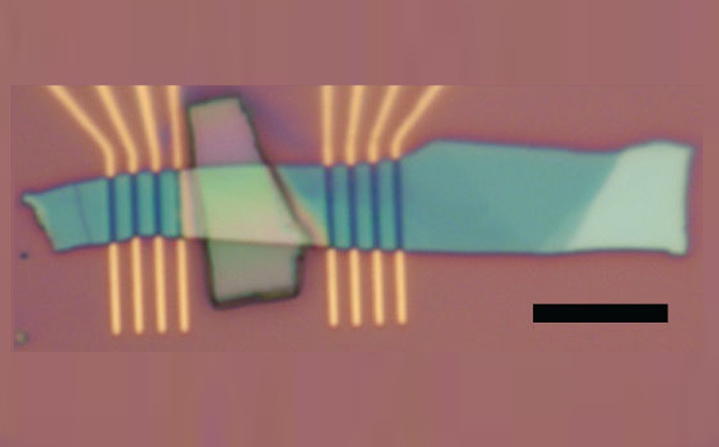PhD Program in Nanoscience
and Nanotechnology
In recent years, certain scientific fields, such as supramolecular chemistry, molecular biology, or surface and low-temperature physics have achieved a remarkable development in our country. Research groups that have obtained an excellent competitive position at international level in the Nanoscience and Nanotechnology area have been formed. In these groups, physicists, chemists, biologists, physicians and engineers work on obtaining, manipulating, organising, studying and exploiting the properties of nano-sized objects.
Maintaining a competitive position in Nanoscience and Nanotechnology requires a high level of competence, specialisation and an adequate multidisciplinary training of the researcher.
Maintaining a competitive position in Nanoscience and Nanotechnology requires a high level of competence, specialisation and an adequate multidisciplinary training of the researcher.
The main objective of the PhD programme is the writing and defence of the PhD thesis in nanoscience.
The student must acquire a high level of professional skills in various fields, especially those requiring creativity and innovation, to cope in contexts with little specific information and to solve complex problems, as well as to design and develop novel and innovative projects.
Thus, the PhD in Nanoscience and Nanotechnology:
The student must acquire a high level of professional skills in various fields, especially those requiring creativity and innovation, to cope in contexts with little specific information and to solve complex problems, as well as to design and develop novel and innovative projects.
Thus, the PhD in Nanoscience and Nanotechnology:
- Offers research training to graduates in Chemistry, Physics, Biotechnology, Chemical or Electronic Engineering, Materials Science and Technology or equivalent and to facilitate their academic, research or professional development.
- Establishes collaborative relationships with high-tech institutions and companies.
- Promotes the cooperation among different universities to develop a research profile in Nanoscience and Nanotechnology sought and recognised by the R&D sector.
The doctoral study guarantees, at least, the acquisition by the student of the following competences:
Basic competences
CB11. Systematic understanding of a field of study and mastery of research skills and methods related to that field.
CB12. Ability to conceive, design or create, implement and adopt a substantial research or creative process.
CB13. Ability to contribute to the expansion of the frontiers of knowledge through original research.
CB14. Ability to carry out critical analysis, evaluation and synthesis of new and complex ideas.
CB15. Ability to communicate with the academic and scientific community and with society in general about their fields of knowledge in the modes and languages commonly used in their international scientific community.
CB16. Ability to promote, in academic and professional contexts, scientific, technological, social, artistic or cultural progress within a knowledge-based society.
Personal capacities and skills
CA01. Dealing with contexts in which there is little specific information.
CA02. Find the key questions that need to be answered to solve a complex problem.
CA03. Design, create, develop and undertake novel and innovative projects in their field of knowledge.
CA04. Work both in a team and autonomously in an international or multidisciplinary context.
CA05. Integrate knowledge, deal with complexity and make judgements with limited information.
CA06. Intellectual critique and defence of solutions.
Basic competences
CB11. Systematic understanding of a field of study and mastery of research skills and methods related to that field.
CB12. Ability to conceive, design or create, implement and adopt a substantial research or creative process.
CB13. Ability to contribute to the expansion of the frontiers of knowledge through original research.
CB14. Ability to carry out critical analysis, evaluation and synthesis of new and complex ideas.
CB15. Ability to communicate with the academic and scientific community and with society in general about their fields of knowledge in the modes and languages commonly used in their international scientific community.
CB16. Ability to promote, in academic and professional contexts, scientific, technological, social, artistic or cultural progress within a knowledge-based society.
Personal capacities and skills
CA01. Dealing with contexts in which there is little specific information.
CA02. Find the key questions that need to be answered to solve a complex problem.
CA03. Design, create, develop and undertake novel and innovative projects in their field of knowledge.
CA04. Work both in a team and autonomously in an international or multidisciplinary context.
CA05. Integrate knowledge, deal with complexity and make judgements with limited information.
CA06. Intellectual critique and defence of solutions.
This doctoral programme involves groups of recognised prestige from the Departments of Inorganic Chemistry, Organic Chemistry, Physical Chemistry and Applied Physics of the universities of Valencia (UV), Alicante (UA), La Laguna (ULL) and Castilla- La Mancha (UCLM), which gives it the multidisciplinary character and critical size needed to become a national benchmark in this strategic area.
The participating research groups are integrated in university institutes such as the Institute of Molecular Science (ICMol) at the UV; the Institute of Materials (IUMA) at the UA; the University Institute of Advanced Studies in Atomic, Molecular and Photonic Physics (IUDEA) at the ULL and the Institute of Nanoscience, Nanotechnology and Molecular Materials (INAMol) at the UCLM.
Professors and researchers that take part in this PhD program are detailed here
The participating research groups are integrated in university institutes such as the Institute of Molecular Science (ICMol) at the UV; the Institute of Materials (IUMA) at the UA; the University Institute of Advanced Studies in Atomic, Molecular and Photonic Physics (IUDEA) at the ULL and the Institute of Nanoscience, Nanotechnology and Molecular Materials (INAMol) at the UCLM.
Professors and researchers that take part in this PhD program are detailed here
This official doctoral programme in Nanoscience and Nanotechnology was created in 2007 and received, by the Ministry of Education, the Quality Award in October 2008 (Reference MCD2008-00082) and the Excellence Mention in October 2011 (Reference MEE2011-00194).
The programme is registered in the RUCT with code 5601462.


Click here for information about
the PhD program offered until
academic year 2021-2022
INFORMATION
the PhD program offered until
academic year 2021-2022



